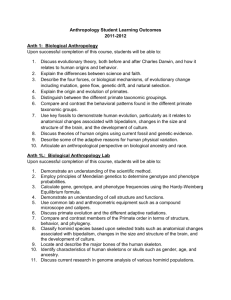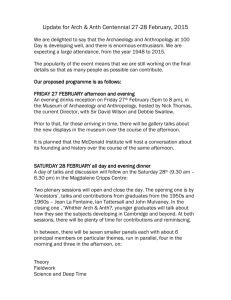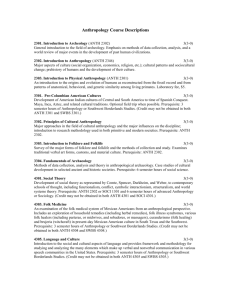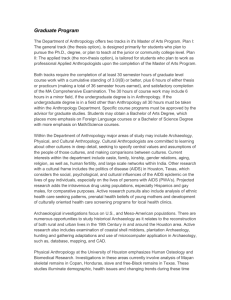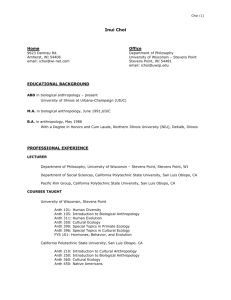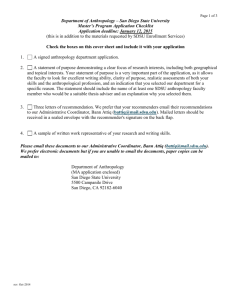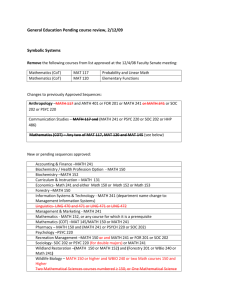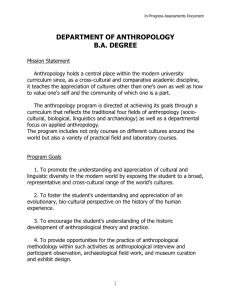Lower Division ANTH 100 Introduction to Cultural Anthropology (5
advertisement
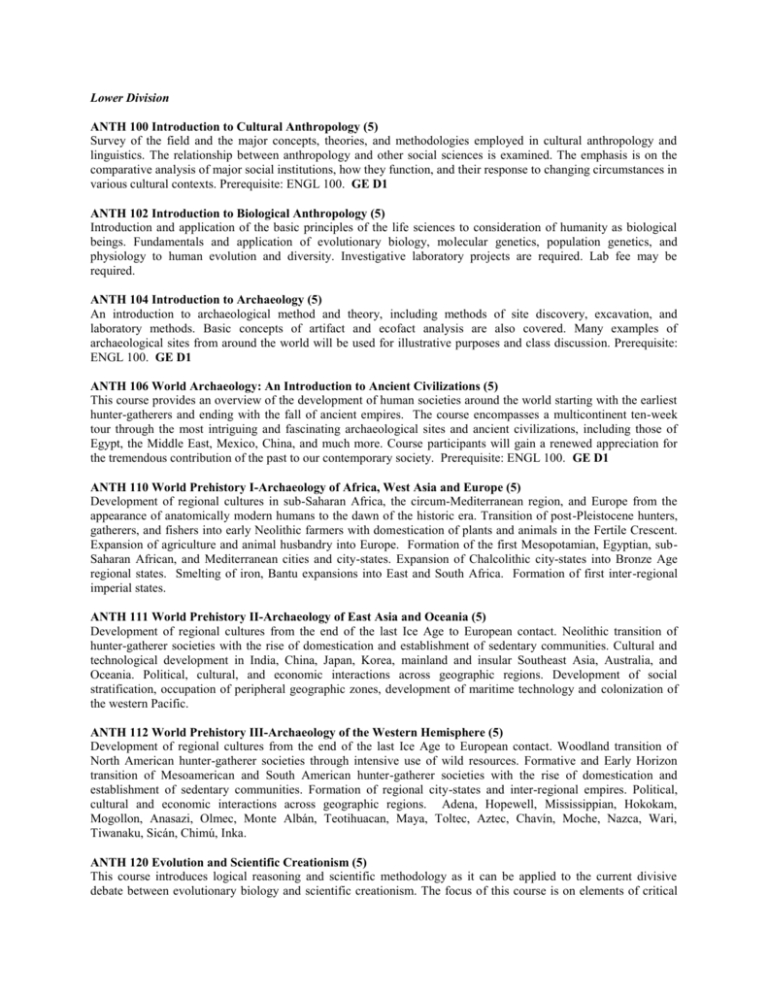
Lower Division ANTH 100 Introduction to Cultural Anthropology (5) Survey of the field and the major concepts, theories, and methodologies employed in cultural anthropology and linguistics. The relationship between anthropology and other social sciences is examined. The emphasis is on the comparative analysis of major social institutions, how they function, and their response to changing circumstances in various cultural contexts. Prerequisite: ENGL 100. GE D1 ANTH 102 Introduction to Biological Anthropology (5) Introduction and application of the basic principles of the life sciences to consideration of humanity as biological beings. Fundamentals and application of evolutionary biology, molecular genetics, population genetics, and physiology to human evolution and diversity. Investigative laboratory projects are required. Lab fee may be required. ANTH 104 Introduction to Archaeology (5) An introduction to archaeological method and theory, including methods of site discovery, excavation, and laboratory methods. Basic concepts of artifact and ecofact analysis are also covered. Many examples of archaeological sites from around the world will be used for illustrative purposes and class discussion. Prerequisite: ENGL 100. GE D1 ANTH 106 World Archaeology: An Introduction to Ancient Civilizations (5) This course provides an overview of the development of human societies around the world starting with the earliest hunter-gatherers and ending with the fall of ancient empires. The course encompasses a multicontinent ten-week tour through the most intriguing and fascinating archaeological sites and ancient civilizations, including those of Egypt, the Middle East, Mexico, China, and much more. Course participants will gain a renewed appreciation for the tremendous contribution of the past to our contemporary society. Prerequisite: ENGL 100. GE D1 ANTH 110 World Prehistory I-Archaeology of Africa, West Asia and Europe (5) Development of regional cultures in sub-Saharan Africa, the circum-Mediterranean region, and Europe from the appearance of anatomically modern humans to the dawn of the historic era. Transition of post-Pleistocene hunters, gatherers, and fishers into early Neolithic farmers with domestication of plants and animals in the Fertile Crescent. Expansion of agriculture and animal husbandry into Europe. Formation of the first Mesopotamian, Egyptian, subSaharan African, and Mediterranean cities and city-states. Expansion of Chalcolithic city-states into Bronze Age regional states. Smelting of iron, Bantu expansions into East and South Africa. Formation of first inter-regional imperial states. ANTH 111 World Prehistory II-Archaeology of East Asia and Oceania (5) Development of regional cultures from the end of the last Ice Age to European contact. Neolithic transition of hunter-gatherer societies with the rise of domestication and establishment of sedentary communities. Cultural and technological development in India, China, Japan, Korea, mainland and insular Southeast Asia, Australia, and Oceania. Political, cultural, and economic interactions across geographic regions. Development of social stratification, occupation of peripheral geographic zones, development of maritime technology and colonization of the western Pacific. ANTH 112 World Prehistory III-Archaeology of the Western Hemisphere (5) Development of regional cultures from the end of the last Ice Age to European contact. Woodland transition of North American hunter-gatherer societies through intensive use of wild resources. Formative and Early Horizon transition of Mesoamerican and South American hunter-gatherer societies with the rise of domestication and establishment of sedentary communities. Formation of regional city-states and inter-regional empires. Political, cultural and economic interactions across geographic regions. Adena, Hopewell, Mississippian, Hokokam, Mogollon, Anasazi, Olmec, Monte Albán, Teotihuacan, Maya, Toltec, Aztec, Chavín, Moche, Nazca, Wari, Tiwanaku, Sicán, Chimú, Inka. ANTH 120 Evolution and Scientific Creationism (5) This course introduces logical reasoning and scientific methodology as it can be applied to the current divisive debate between evolutionary biology and scientific creationism. The focus of this course is on elements of critical thinking, including deductive and inductive reasoning, proofs, probabilities, the influence of values, the status of evidence, and legal reasoning. In the context of examining the evidence and arguments offered for and against evolution and scientific creationism, students will demonstrate skills in elementary inductive and deductive processes, including an understanding of the formal and informal fallacies of language and thought, and the ability to distinguish matters of fact from issues of judgment or opinion. GE A3 ANTH 121 Amazing Archaeology (5) Exploration of pseudoscientific claims based on archaeological evidence with a focus on elements of critical thinking, including deductive and inductive reasoning, proofs, probabilities, the influence of values, and the status of evidence. Assessment of current understanding of peopling of the New World, Atlantis, Ancient Astronauts. Noah’s Ark, Shroud of Turin, and Stonehenge. GE A3 INST 205 Perspectives on Women in Society (5) This is a required course in the Women and Gender Studies Minor. (For course description, see listing under “Interdisciplinary Courses.”) GRE ANTH 252 Native Peoples of North America (5) An introduction to the Indian, Inuit, and Aleut peoples of North America from their arrival on the continent through contact with peoples from Europe, Africa, and Asia. The course will examine the social, economic, political, and religious aspects of the various groups and will include a discussion of the impacts of Euro-American culture on Native peoples. Prerequisite: ENGL 110. GRE ANTH 253 Peoples and Cultures of South Asia (5) Overview of the diverse peoples and cultures of South Asia. Exploration of the influence of geography on subsistence patterns, and how nomadic pastoralism, village communities, and cities form a unique social ecology that profoundly influences contemporary political and religious interactions. Examinations of the family, the caste system, and religion, and the impact upon each from modernization. Prerequisite: ENGL 110. GE D1 ANTH 277 Selected Topics in Anthropology (1-5) Specialized topics in anthropology offered periodically as announced. May be repeated on a different topic. Prerequisite: Permission of instructor and approval by the Anthropology Program Coordinator. Credit or no-credit only. [By Petition] ANTH 289 Experiential Prior Learning (1-5) Evaluation and assessment of learning that has occurred as a result of prior off-campus experience relevant to the curriculum of the Department. Requires complementary academic study and/or documentation. Offered on a credit, no-credit basis only. Not open to postgraduate students. Interested students should contact the Community Service office. Prerequisite: Permission of instructor and approval by the Anthropology Program Coordinator. [By Petition] ANTH 291 Introductory Field Archaeology (5) The purpose of this course is to introduce students to the basic concepts of field archaeology. Students will be trained in the use of maps, field equipment, how to recognize and record archaeological sites, and survey techniques. (Laboratory fee may be required). ANTH 298 Directed Study in Teaching Anthropology (1-5) Theory and method in lower division instruction. Weekly meetings with faculty instructor that may include administering and developing examinations, individual tutoring and discussion group leadership, and directed readings of relevant topics. Prerequisite: Permission of instructor and approval by the Anthropology Program Coordinator. May be repeated for different course content. [By Petition] Upper Division ANTH 300 Introduction to Research Methods (5) An introduction to major concepts, skills and techniques of research methods in the social sciences. This will include the assumptions of the scientific method, basic principles of qualitative and quantitative research methods in the social sciences, and data collection and analysis. Prerequisites: MATH 140 (or equivalent). Must pass course with grade of C- or higher in order to advance to second course in Methods sequence. ANTH 302 Human Osteology (6) Growth, development, and alteration of the human skeleton. Determination of age, sex, stature, and genetic ancestry from bones and teeth. Skeletal remains for diagnosis of disease and identification of cultural practices. Three lectures and three laboratory periods per week. Prerequisite: ANTH 102 or BIOL 100 or 250. Must pass course with grade of C- or higher in order to satisfy second course in Methods sequence. ANTH 306 Primate Behavior (5) This course provides an upper-division survey of behavior and appearance of living nonhuman primates. Emphasis is placed upon assessment of primate behavior from three perspectives. An internal perspective that seeks to determine the impact of diet, reproduction, infant care, and social group mobility on primate behavior. An external perspective that provides an assessment of how ecological conditions, other primate species, and other animals affect primate behavior, and an evolutionary perspective that attempts to understand how living primates came to behave the way they do and the relative contributions of in-born, instinctive behaviors versus socially learned behaviors to primate activities. Prerequisites: ANTH 102 or BIOL 100. ANTH 310 Anthropology through Film (5) Examination of cultural variation through ethnographic films and commercial cinema from an anthropological perspective. Consideration of cultural values, gender roles, social stratification, and other socialized phenomena as depicted in American films, American films reinterpreted by non-American directors, foreign films reinterpreted by American film directors, as well as non-American films conceived and directed by non-American directors. Evaluation of the universals portrayed in films worldwide as well as culturally-specific use of symbology to depict those universals. GE T3 BEHS 318 Psychological Anthropology (5) (For course description, see listing under “Interdisciplinary Courses.”) ANTH 330 Diversity in the Classroom (5) This course examines various types of diversity teachers will encounter in the classroom in the United States, including race, ethnicity, social class, sexual orientation, and immigration status. Prerequisite: ANTH 100, PSYC 310, or CAFS 350. ANTH 339 Sexual Behavior in Cross-Cultural Perspective (5) Analysis of the patterns of sexual behavior particularly in non-Western cultures from evolutionary, sociocultural, and historical perspectives. The ways and means by which concepts of sexuality are integrated within the larger sociocultural system with particular attention being given to the impact of gender, race, ethnicity, class, and sexually transmitted diseases (especially the significant effect of AIDS) upon sexual expression. GRE ANTH 340 People and the Environment (5) An examination of the basic adaptations of humans to their environment with the association and interaction between geography, environment, adaptation, and culture being the primary focus. The basic concepts of ecology and the adaptive strategies of hunter-gatherers, pastoralists and agriculturalists are discussed in detail. Consideration also is given to the changing adaptations of cultures undergoing modernization and to the impact of human cultures on the modern environment. GE T3 ANTH 350 Peoples of Mexico (5) An analysis of social, economic, political and religious institutions in various contemporary rural Indian and Mestizo communities from socio-historical and ecological perspectives. Particular emphasis on examination and analysis of current socioeconomic issues impacting indigenous populations in Mexico and their strategies to cope with ongoing processes of globalization. GE T3 ANTH 351 Native Peoples of California (5) This course provides an overview of California Indian groups, including a brief discussion of the origin and prehistory of native peoples and a detailed treatment of the diversity of aboriginal cultures prior to European contact. Analysis of the impact of Europeans, problems of intercultural relations, and the current status of California Indians. Prerequisite: ANTH 100 or permission of instructor. GE T3 ANTH 370 Globalization and Cultural Change (5) Examines the impact of European economic and political expansion on non-Western cultures with particular attention to the effects of global capitalistic processes within the last half of the twentieth century, as well as indigenous responses to those global pressures. Historical consideration of the pre-colonial and colonial setting, organized responses to colonial and Western domination, economic dependency, and contemporary strategies for dealing with globalization, including transmigration. BEHS 382 The Aged (5) (For course description, see listing under “Interdisciplinary Courses.”) GE T3 ANTH 390 Method and Theory in Archaeology (5) Theory, method, and techniques of fieldwork, data analysis, reconstruction of prehistoric cultures, and the interpretation of culture history. Problem formulation and research design in archaeology. History and contemporary developments in archaeological research. Prerequisite: ANTH 104 or permission of instructor. Must pass course with grade of C- or higher to satisfy second course in Methods sequence. ANTH 391 Intermediate Field Archaeology (5) Archaeological excavation and survey in the greater Kern County region. All aspects of field techniques are covered: field reconnaissance and survey, site recording, mapping, excavation, and evaluation of data. Students conduct survey, mapping, and excavate at selected archaeological sites. A field trip fee may be required. Consult the class schedule for specific details. Prerequisite: ANTH 291 or permission of instructor. ANTH 392 Introduction to Laboratory Methods in Archaeology (5) An introduction to the basic methods in laboratory analysis of archaeological data, including cataloging, typology, metric tabulation and analysis, and curation. Students will participate in special archaeological studies such as faunal analysis, paleobotanical analysis, and dating. The writing of archaeological reports will also be covered. Prerequisite: ANTH 104 or equivalent. ANTH 396 Human Corps (1) One unit of credit for 30 or more hours of volunteer community service experience. Open to students with appropriate anthropology background. The student may suggest a suitable placement or request an assignment from the Anthropology Program Coordinator. Only one unit of Human Corps credit may be earned per term, and no more than 12 units of all Human Corps credit may be applied toward the baccalaureate degree. Offered on a credit, nocredit basis only. Prerequisite: permission of instructor and approval by the Anthropology Program Coordinator. Credit or no-credit only. [By Petition] ANTH 403 Forensic Anthropology (5) A survey of methods used by forensic anthropologists to recover and identify human remains for legal purposes. Topics covered include forensic archaeology; differentiation between human and nonhuman remains; individual identification from age, sex, stature, genetic ancestry, health-status, and anomalous features. Prerequisites: ANTH 302 or permission of instructor. ANTH 404 Human Evolution (5) Examination of the history and current status of scientific inquiry into human origins and evolutionary development of humanity from our primate foundation to the appearance of anatomically modern humans. Prerequisite: ANTH 102 or BIOL 100 or permission of instructor. ANTH 405 Bioarchaeology (5) Analysis of evidence from the human skeleton for interpretation of human behavior in the prehistoric past. Survey of cultural attitudes concerning death, social status, and beauty, from disposition of the body, differential health status, and ornamentation. Consideration of the impact of habitual and acute stresses through pathological affliction and assessment of biomechanical properties. Assessment of dietary behavior through trace elements, stable isotopes, and dental diseases. Evaluation of violent behavior, domestic and institutional, through trauma. Prerequisites: ANTH 104 and 302 or permission of instructor. ANTH 406 Primate Evolution (5) Evolution and diversification of the primate order from the first primates to the appearance of the Great Apes. Skeletal anatomy, evolutionary theory, and living primates as bases for exploring the development of nonhuman primates. Prerequisite: ANTH 102 or 306. ANTH 302 recommended. ANTH 410 Anthropology of Death (5) Consideration of the death experience in the broadest possible context. Survey of funerary practices encompassing mummification, burial, exposure, cremation, and endocannibalism. Examination of historical and ethnographic observations of mortuary practices and attitudes, as well as their utility for building analogies for interpretation of mortuary practices and attitudes of past peoples from archaeological remains. Use of mortuary practices for reconstruction of gender roles, social stratification, valuation and agency. Constraint of political considerations— both past and present—that call into question fundamental assumptions about death, dying, and monumentalism held by many. [Variable Quarters] ANTH 415 Cultural Resource Management (5) This course is designed to provide students interested in archaeology and/or environmental studies with a background in the legislation and rules that govern the consideration of cultural resources in the context of environmental impact studies. Requirements regarding the disposition of human remains and coordination and consultation with Native Americans. ANTH 421 Linguistic Anthropology (5) Examination of the socio-cultural context of language use. Consideration of sociolinguistics in cross-cultural perspective and the various uses for sociolinguistics such as ethnopoetics, the ethnography of performance, language ideology, language planning and language revitalization efforts, as well as learning methods of transcription for anthropological analysis. Prerequisite: ANTH 100 or equivalent. ANTH 434 Qualitative Research Methods (5) Collection, analysis, and reporting of qualitative data from social settings in everyday life. Qualitative methods considered include, but are not limited to, participant observation and interviewing techniques. We also emphasize the ethics of qualitative research. Formulation of research problem and use of conceptual and theoretical materials in your analysis of qualitative data. Lab sessions will include computerized analyses of data. Prerequisite: ANTH 300 or equivalent course. Must pass course with grade of C- or higher to satisfy second course in Methods sequence. BEHS 435 Family and Kin: Comparative Perspectives (5) This course counts as an elective for the Women and Gender Studies Minor. (For course description, see listing under “Interdisciplinary Courses.”). GRE ANTH 438 Anthropology of Gender (5) A cross-cultural examination of the social construction of gender roles in societies across time. Particular attention given to analyzing the cultural forces that determine how women’s roles are defined and how they change. GRE ANTH 473 Historical Archaeology (5) The study of the archaeological remains of cultures for which there is a written historical record. Topics to be covered include the definition and history of historical archaeology as a unique discipline, its analytical methods, theoretical issues, contemporary approaches, and practical applications. Prerequisite: ANTH 104 or permission of instructor. ANTH 474 Archaeology of California (5) This course provides a general overview of California archaeology. Topics to be covered include a review of the development of archaeological method and theory in California, a region-by-region synthesis of prehistory, and the status and direction of current research. Prerequisite: ANTH 104 or permission of instructor. ANTH 475 Prehistory of North America (5) The prehistory of North America, north of Mexico, is examined in detail from the first entry of people to the continent to the time of contact with Euroamericans. Emphasis on cultural development over time, ecological interactions, and implications of the human occupation of North America. GE T3 ANTH 477 Selected Topics in Anthropology (1-5) Specialized topics in anthropology offered periodically as announced. One course in anthropology recommended. May be repeated for different course content. Prerequisite: Permission of instructor and approval by the Anthropology Program Coordinator. [By Petition] ANTH 480 Introduction to Lithic Technology (5) The aim of this course is to provide the student with a more complete understanding of flaked and ground stone artifacts recovered from archaeological contexts. Students will learn to identify lithic tool material types, how to analyze flaked stone tools and lithic debris, and become familiar with the theoretical issues related to stone tool raw material acquisition and production. An emphasis is placed on experimental tool production studies and students will be required to engage in flaked stone replication. Prerequisite: ANTH 104 or permission of instructor. ANTH 481 Directed Research in Anthropology (1-5) Students design and carry out a research project under the supervision of a faculty sponsor. Prerequisite: Permission of instructor and approval by the Anthropology Program Coordinator. Credit or no-credit only. [By Petition] ANTH 482 Archaeological Faunal Analysis (5) This course will teach students basic skills for the identification of both invertebrate and vertebrate faunal remains recovered from archaeological sites. Students will learn the essential morphological attributes of both invertebrate and vertebrate fauna most frequently found in archaeological contexts; learn how to prepare comparative shell and skeletal collections; and become acquainted with taphonomic processes and other agents of bone and shell modification. Prerequisite: ANTH 104, or 102 or BIOL 100 or permission of instructor. ANTH 489 Experiential Prior Learning (1-5) Evaluation and assessment of learning that has occurred as a result of prior off-campus experience relevant to the curriculum of the Department. Requires complementary academic study and/or documentation. Offered on a credit, no-credit basis only. Not open to postgraduate students. Interested students should contact the Community Service office. Prerequisite: Permission of instructor and approval by the Anthropology Program Coordinator. Credit or nocredit only. [By Petition] ANTH 490 Senior Seminar in Anthropology (6) This course, often referred to as the culminating undergraduate experience in Anthropology, examines from a holistic perspective critical themes in the discipline. Integration of materials from previous courses. Development of thematic synopses, public presentations, and constructive criticism skills. Prerequisites: Upper-division subdisciplinary required courses, required method sequence of courses. May be repeated for credit with instructor’s consent. ANTH 492 Advanced Laboratory Methods in Archaeology (5) Advanced techniques of dating, soils analysis, faunal analysis, botanical analysis, lithic analysis, chemical analyses, typology, and materials analyses. Laboratory fee may be required. Prerequisites: ANTH 292. Must pass course with grade of C- or better required. ANTH 496 Internship in Anthropology (1-5) Supervised field experience in community organizations and institutions. Prerequisites vary depending on specific internship, but enrollment is limited to students with good academic records who are committed to development of professional skills in a given area. Offered on a credit, no-credit basis only. May be repeated for credit. Prerequisite: Permission of instructor and approval by the Anthropology Program Coordinator. [By Petition] ANTH 497 Cooperative Education (5) The Community Services program offers a sponsored learning experience in a work setting, integrated with a field analysis seminar. The field experience is contracted by Community Services office on an individual basis, subject to approval by the Department. Students are expected to enroll in the course for at least two quarters. The determination of course credits, evaluation, and grading is the responsibility of the Departmental faculty. Offered on a credit, nocredit basis only. Prerequisite: Permission of instructor and approval by the Anthropology Program Coordinator. [By Petition] ANTH 498 Directed Study in Teaching Anthropology (1-5) Theory and method in upper division instruction. Weekly meetings with faculty sponsor and supervised experience that may include administering and developing examinations, course development, discussion group leadership, selected lectures, and in-depth directed readings of relevant topics. Prerequisite: Permission of instructor and approval by the Anthropology Program Coordinator. May be repeated for different course content. [By Petition] ANTH 499 Individual Study (1-5) Individual study under the direction of a faculty member. Prerequisite: Permission of instructor and approval of by the Anthropology Program Coordinator. Credit or no-credit only. [By Petition] Graduate Courses BEHS 500 Quantitative Methods in the Behavioral Sciences (5) (For course description, see listing under “Interdisciplinary Courses.”)
